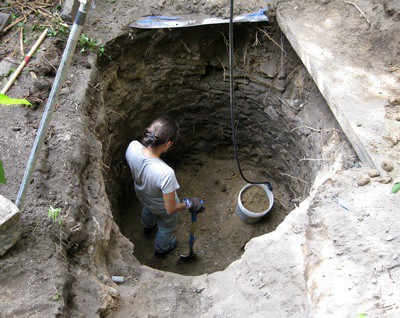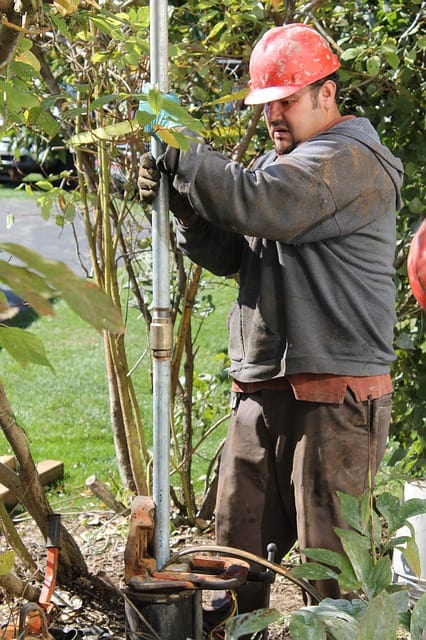A well is an excavation to extract water from an aquifer. To be able to create one, different digging methods are used. In the United States, the most common method used is drilling, through the use of a drill rig. This is mounted on a truck and can dig up to 400 meters deep or even more. This method is quite expensive, so you might want to know exactly how much does it cost to dig a well.
Average Costs To Dig A Well
The average cost of drilling a water well varies depending on which method is used. The price is also generally rated based on how deep it will be and the level of difficulty.

For instance, with drilling the hole and the installation of the case and the well cap, the cost of water installation is around $15 to $30 per ft. For a 100-meter deep well, it could cost somewhere from $1,500 to $3,000. It could cost even more the deeper the well goes.
Additional Costs
Before you can even start your project, you are supposed to secure a permit from the city or county government you live in, depending on the regulatory requirements. In Colorado, a new water well permit costs $100, while a replacement one costs $60.
When it comes to digging a well, the total cost is not only comprised of the drilling and the water installation costs. Once the well is drilled, a water system is created.
The entire water system includes electrical wiring, pressurized storage tanks, and a control panel, among others. You also have to factor in the cost of a pump system. This is utilized to bring the water to the surface.
These components could add up to around $2,000 to $8,000 in total cost. Hence, the complete water system can cost anywhere from $3,500 to $11,000 or more.
For a private water delivery, the cost of the water system ranges from $3,000 to $20,000. A much more intricate water system could cost between $20,000 and $50,000.
Factors Affecting the Cost to Dig a Well
The price of digging a well depends on several factors, such as the following:
- Depth of the well – since the initial basis of the cost is how deep the drilling will be, the deeper your intended project is, the more costly it will be.
- Quality of the soil – soil quality varies throughout the country and you can encounter different soil conditions ranging from sand, clay, gravel, up to rocky. These complexities are the main obstacles in this type of project, as they stand in between the surface and the aquifer. Therefore, the soil quality will dictate whether the intended digging will be a breeze or otherwise.
- Accessibility – there are instances wherein the areas are difficult to access, so the well drilling cost is much more expensive. Also, this could be a reason why mobilization of equipment might be more challenging than usual, therefore, more costly.
- Yield – water yield can also determine whether drilling a well will be more or less costly than usual. The ideal soil would be nice and loose to produce a high water yield, but somehow heavy and concentrated enough to sieve rainwater efficiently before it reaches the groundwater.
- Drilling company – well drilling is quite expensive, so you would not want to take any chances of making a crucial mistake of getting the services of an unqualified contractor and having to redo everything when things go wrong. Make sure that you only get a certified, professional, and reliable contractor who can do the job, but this can be more expensive.
Different Types of Wells
There are three different types of wells, which include dug wells, drilled wells, and driven wells. How are they different?
- Dug Wells – They are the oldest types, as wells are lined on top using materials like concrete or bricks. These materials keep the water from infiltrating the well.
- Drilled wells – They are the most common type of well used these days, and they can go really deep into the ground.
- Driven Wells – Using a certain perforated pipe, they are pounded deep into the ground. They are not too common, but they are a better option if the aquifer is shallow.
What to Expect
How long will it take to drill a well? It usually takes several days, including the installation of the casing.
The drill rig is mounted on the truck and positioned in the target area. There are certain areas that would require a permit, and there are also regulations.
There is a tool provided by the Water Systems Council to help you with the state code pertaining to digging a well.
Where to Find Well Drilling Contractors
You can start by looking at the National Ground Water Association. It provides a list of resources, licensing agencies, and other reports that you need in order to learn more about the different contractors and the methods they use.
Before selecting a contractor, it actually helps to have at least a set of information and to have several prospects. You can also search the web for other options.
You can also look at the license number and read reviews and feedback. There are important considerations to help you get the best contractor.
For one thing, you need to make sure that the contractor has the necessary licenses and permits to operate. You need to know if the contractor is certified by the National Ground Water Association. The highest level given to a contractor is that of a Master Ground Water Contractor.
Aside from the license, you also need to know if they have submitted well logs and if they have enough equipment. How about insurance?
These small details might appear to be unimportant, but in the event something happens, at least you know you are in good hands.
Itemizing Costs
When you have finally hired a contractor and there is a written contract, take the time to review the details and make sure that the costs are itemized.
The list could include the cost of drilling per foot, casing per foot, and the cost of materials used like well caps, grout, and drive shoes. The contractor may also include other costs for operations like test pumping, disinfection, and grouting.
In the written contract, it should also state what costs are not included in the given specifications.
Checklist for Finished Well
A final inspection should be conducted after the job is finally done and prior to the contractor pulling out the equipment. Have a list of items to check to ensure that the work is properly and completely done.
The first is to check the depth of the well. Check the measurement against the report given to you.

The second is the well yield. You can ask the contractor how many gallons per minute the well can produce.
In addition to the well depth and yield, look at the well cap. Make sure that the well is capped and that it is secured.
The cap should be at least 6 inches above the ground. You can also ask the contractor if the well was disinfected.
Last but not least, you should have a well record. Get a copy from the contractor. Keep this record for future use.

I’ve toyed with the thought of drilling a well on my property. It’s good to know that I should take the time to itemize the costs with my contractor. I would imagine that a contractor would be able to help me do this and make sure I’m not missing anything.
You are right– when choosing a contractor to drill a well, it is important that you choose someone with experience that can get the job done. I’ve known a lot of people who have hired people that don’t have a lot of experience. In the end, they regretted their decision.
Well, that’s a point which everyone would agree upon 🙂
My in-laws have been talking about having a well drilled. I’m sure they would appreciate the different items to take into account. I imagine that making sure that each of those items is done will prevent you from being scammed.
We used flint hills drilling such professional experience. Nothing like having our own water well. would do it again..
I need to get a well decommissioned wat is the average cost
WOULD LIKE TO KNOW HOW MUCH TO CONTINUE TO ADD TO WHAT HAS ALREADY BEEN DRILLED.
NEED ANOTHER 40 FT.